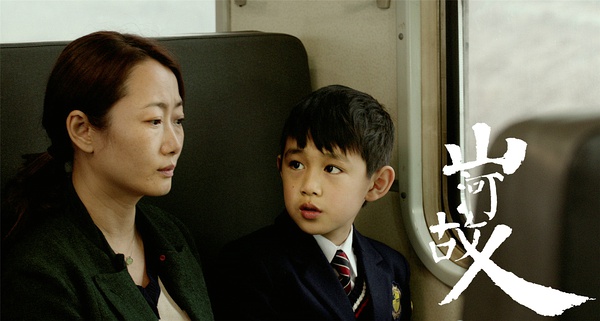(单词翻译:单击)

【电影简介】
1999年,汾阳姑娘沈涛陷入了与小镇青年张晋生和梁建军的三角恋中,她最终选择了追逐金钱的张晋生,梁建军则只能郁郁离开。
2014年,沈涛与张晋生离婚,张晋生带着儿子Dollar再婚并去上海生活,而梁建军因为身患绝症回到家乡,他在无奈之下找到沈涛借钱治病。由于沈涛的父亲去世,Dollar回到了汾阳参加葬礼,沈涛深感儿子的变化,知道他不可能留在自己身边,只是把家门的钥匙给了他。
2025年的澳洲,Dollar长大,在中文学校学习,认识了张艾嘉饰演的老师,老师与前夫离婚后,也处在一种不安定的状态中,恰好与进入叛逆期想要追求自由的Dollar心灵相通,两人发生了一场忘年恋,Dollar虽然一直挂着母亲给他的钥匙,但他已经想不起母亲的名字,只记得她叫涛,波浪的意思。
【音频文本】
Heaven and earth do not act from the wish to be benevolent; they treat all things and beings equally as they would dogs of grass. This sentence from the classic Taoist text explains Jia Zhangke's approach to formulate his new story, but paradoxically, his leitmotif is one of utmost sympathy and compassion.
Life of ordinary people in Jia Zhangke's hometown Fenyang, north China's Shanxi Province is a recurring theme in his films. "Mountains May Depart" begins with a love triangle involving three young people Tao, Jinsheng and Liangzi in the very city back in 1999. Tao's indecision between the two suitors, a coal mine owner and a miner, appears to be aggravating a rift within the small group, but little does she know the divide is caused as much by the competition for her favor as by the development of the country's economy.
In 2014, the same group of people continue to grow apart. Miner Liangzi is out of the picture after being diagnosed with terminal disease, Tao and Jinsheng have been married and divorced and their little son becomes an immigrant in Australia.
The third part of the film goes beyond Jia's familiar time and space and follows the son in Australia in 2025. The young man named Dollar finds himself lost in a rootless life, as he has totally forgotten about his mother in Fenyang.
In China's major cities, economic development has fed high-flying office workers who speak foreign languages, but Jia Zhangke has always focused on the fate of dialect-speaking ordinary people in smaller cities. Many of his previous films capture people who struggle to catch up with the tide, and despite Jia's insistence on sectional formats, critics still appreciate his intimate observation and insight.
But things are a bit different with the new film. "Mountains May Depart" still comes in roughly three parts, but the story is more linear than ever before. More importantly, the kind of intimate observation seems to have disappeared, and the characters now seem vacant and soulless.
That's because all is symbolic in "Mountains May Depart." Props, music, graphics and even the characters are stripped of their own reasons, they are here to serve one purpose: to highlight men's solitude against the tyranny of time. 1990s Taiwan pop star Sally Yeh's "Zhen Zhong" is not a song to be appreciated, but a link that connects all parts. Like an arbitrary composer, Jia Zhangke exploits everyone and everything at his disposal to create a symphony of melancholy.
People die, homes are abandoned, traditions are lost and even mountains may depart. Without love, we are all destined to be alone, prisoners of our own time.
In "Mountains May Depart", Jia Zhangke shifts his focus from the underprivileged and the obscure to a wider range of humanity, to remind all of us about the cost of modernization. This is a much more efficient use for his insight, creative genius and capacity for compassion. And if that means a few critics need to expand their scope to understand the director, I suggest they take the extra effort, for their own good.
轻松调频EZFM 微信mrweekly


